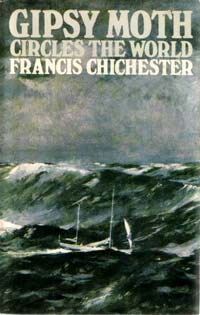Sir Francis Chichester
Gipsy Moth Circles the World
Sir Francis Chichester is a great British eccentric and one of whom any in these isles may be rightly and justifiably proud. An adventurer by nauture, Chichester had survived amongst other things crashing his plane into Katsuura harbour in 1931, before changing tack and entering ocean racing, making a trans-Atlantic record attempt in Gypsy Moth III during 1962.
In 1964 prior to a trans-Atlantic race in which he came second, Chichester had asked that preliminary sketches for what was to become Gypsy Moth IV be prepared by Illingworth and Primrose, and space was booked at Souter's boatyard in Cowes for construction. Chichester came in second in his race, but by that time victory had become a secondary consideration to testing himself and his tactics with a view to a round-the-world attempt.
 After more than two years of the usual trials and tribulations that seem endemic to any boatbuilding saga, Gipsy Moth IV slid down the ways and began showing the problems of which Chichester would complain: "There, the hull floated high. Then, two or three tiny ripples from a ferry steamer made folds in the glassy surface, and Gipsy Moth IV rocked fore and aft. 'My God,' Sheila and I said to each other, 'She's a rocker!'."
After more than two years of the usual trials and tribulations that seem endemic to any boatbuilding saga, Gipsy Moth IV slid down the ways and began showing the problems of which Chichester would complain: "There, the hull floated high. Then, two or three tiny ripples from a ferry steamer made folds in the glassy surface, and Gipsy Moth IV rocked fore and aft. 'My God,' Sheila and I said to each other, 'She's a rocker!'."
The way in which such episodes are written inclines one to believe that a certain literary licence has been taken with the precise details of some aspects of the voyage in order to promote a pseudo-mythical sub-plot of "ageing englishman overcomes the odds to achieve Round the World triumph!" However, in the interests of good story telling it is preferable to forgive Chichester and to revel in the engaging prose he writes.
Calm and composed, with a selective use of exclamation, he reads with the effortless ease of the quintessential English gentleman, The unwanted excitements of the Roaring Fories and Cape Horn are handled in as considered a way as the frustrations of the Doldrums.
What does seem to pervade this work is Chichester's enjoyment of being at sea contrasted sharply with the irritability of living in and working with what Chichester describes as a poorly designed boat (which nevertheless succeeded in circumnavigating the globe!). I don't think that we have here the high drama of Peter Nichol's writings, but that is perhaps because we are reading an account of a well planned and executed voyage. This is not to say that this book is without drama: capsize, gybes and disastrous eggs all adding their distinct flavour to this book.
This is a superbly written book about a one of it's kind voyage made by a remarkable man. Rightly a literary classic, this book is as fresh, interesting and rewarding as when it was first published, and should be enjoyed by any with a taste for adventure and the sea.
Alistair Wasey

